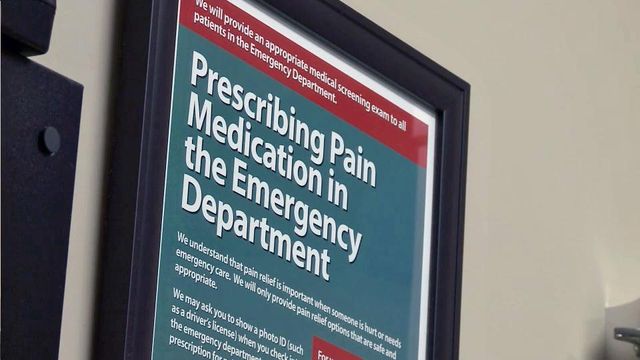Pinehurst hospital puts its foot down on narcotic abusers
To counter abuse of the system, a group of physicians, pharmacists and law enforcement officers in Moore County have committed to checking IDs and the state's controlled substance database before prescribing narcotic pain relievers.
Posted — UpdatedAccording to a 2008 study by the International Narcotics Control Board, this is one of the reasons why the United States consumes 99 percent of the world’s hydrocodone and 83 percent of its oxycodone.
Every 19 minutes, one person in the U.S. dies from a prescription drug overdose, according the Centers for Disease Control and Prevention.
“One hospital says they will no longer feed that habit,” WRAL’s Dr. Allen Mask said.
Emergency physician Dr. James Lewis, of First Health Moore Regional, wants to continue to help patients suffering from acute pain. However, he knows many patients abuse the system by visiting multiple doctors and emergency departments to get large amounts of narcotic pain relievers.
“Like patients coming in having car accidents,” Lewis said. “[We] look at the medicines they are on and a lot of them were on a large number of narcotics,” he said. “This shouldn’t be going on,” he added.
To counter abuse of the system, a group of physicians, pharmacists and law enforcement officers in Moore County have committed to checking IDs and the state’s controlled substance database before prescribing narcotic pain relievers.
“Yeah, we’re not going to write for your long-standing narcotics [users] here anymore,” Lewis said. “We are going to give you other options for care. We want to try to help you and make our overall community a much safer place,” he said.
First Health doctors will not refill stolen or lost prescriptions or prescribe missed methadone doses to patients, according to Mask.
However, these new policies do not mean that patients with legitimate severe pain won’t get compassionate care.
“They are trying to stop abuse of these highly addictive drugs and look for other pain management options when possible,” Mask said.
Patients with addictions to narcotics will be referred to psychiatrists and special programs that are intended to aid them in beating their addiction. Other patients may be referred to chiropractors or physical therapists to find more natural methods of pain relief, according to Mask.
“This is a national problem and many hospital systems are coming up with policies to deal with the problem,” Mask said.
• Credits
Copyright 2024 by Capitol Broadcasting Company. All rights reserved. This material may not be published, broadcast, rewritten or redistributed.





